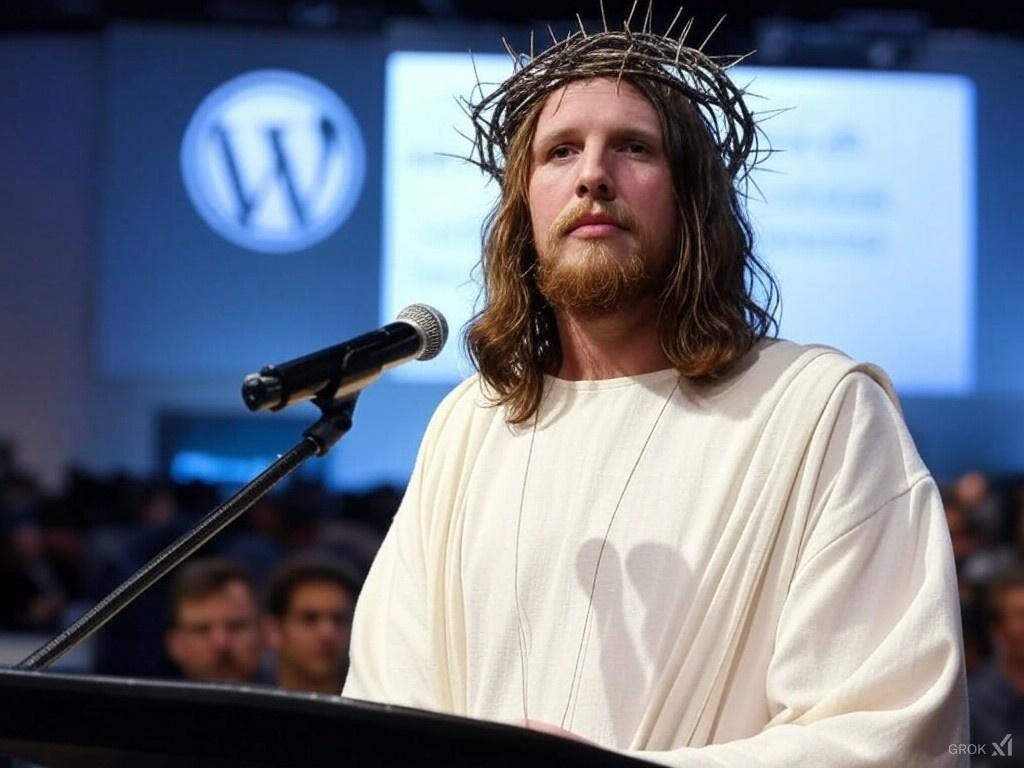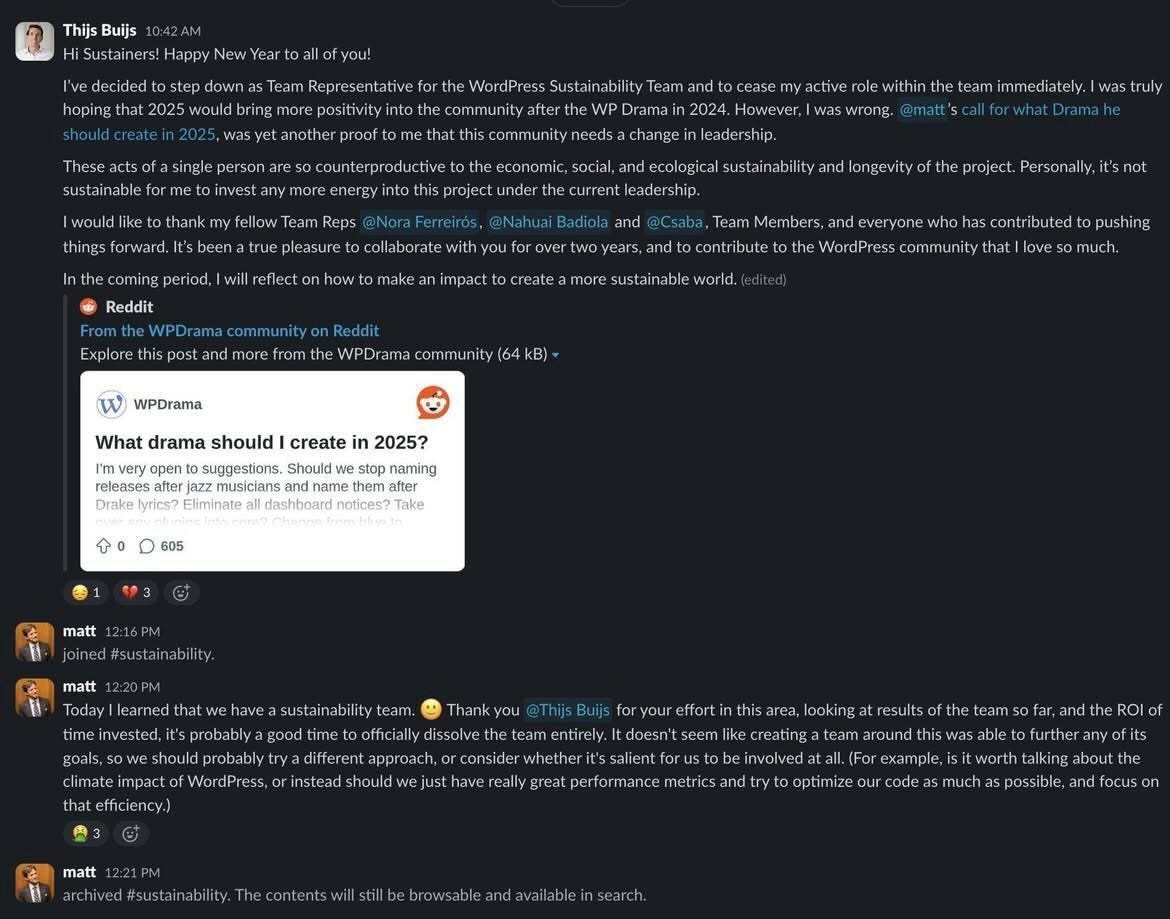🚨 Big Changes in WordPress: Automattic Scales Back, Fork Debate Heats Up, & Sustainability Team Dissolved | WP More
2025 is off to a dramatic start for WordPress! This week, we dive into Automattic’s reduced contributions, Mullenweg’s fork proposal, and the sudden end of the Sustainability Team. Don’t miss this!
Hey, WordPressians!
The first weeks of 2025 are bringing seismic shifts to the WordPress ecosystem. Today's issue covers three interconnected developments that could reshape WordPress's future. From Automattic's dramatic scaling back of contributions to heated debates about project leadership and the unexpected dissolution of key community initiatives, we're witnessing perhaps the most significant transformation in WordPress's governance since its inception.
Automattic Scales Back: A New Chapter in WordPress Development
Automattic, WordPress's largest historical contributor, has announced a dramatic reduction in its open-source contributions, matching WP Engine's 45 pledged hours amid their ongoing legal dispute. This decision effectively pauses the operations of Dotorg, Automattic's WordPress-focused division that previously contributed 3,539 weekly hours through 104 team members.
The company's Dotorg employees have ceased work on core WordPress projects, including Gutenberg, Playground, Openverse, and WordPress.org. Instead, they're shifting focus to Automattic's commercial products like WordPress.com, Pressable, WordPress VIP, Jetpack, and WooCommerce.
What's particularly interesting is how this reshapes the contribution landscape. Looking at the current Five for the Future numbers, we're seeing rtCamp emerge as the new leading contributor with 454 weekly hours, followed by Multidots and GoDaddy. This marks a significant shift in WordPress's development dynamics.
What This Means for WordPress's Future
The reduction in Automattic's involvement raises several critical questions:
How will WordPress 6.8 and future releases be managed?
What roles will Automattic's key personnel, including Executive Director Mary Hubbard, play going forward?
How will the broader WordPress community step up to fill the contribution gap?
With legal proceedings expected to continue at least through June 2025, these changes might shape WordPress's development landscape for the foreseeable future.
Also read: WordPress 6.8: Release Squad, Timeline, and Focus
WordPress Fork Debate: Mullenweg Responds to Community Leadership Challenge
Expanding on our coverage of WordPress's evolving governance landscape, Matt Mullenweg has responded to Joost de Valk's recent proposal for project leadership changes with an unexpected suggestion: create a fork.
In a detailed blog post in the official WordPress.org blog, Mullenweg frames forking as a healthy exercise for open source projects, seeing it as an opportunity to experiment with different governance models and technical approaches. He specifically addresses the possibility of what he playfully dubbed "JKPress" - a potential fork led by de Valk and Karim Marucchi.
In a decisive move, Mullenweg has deactivated the WordPress.org accounts of several prominent community members, including de Valk, Marucchi, Se Reed, Heather Burns, and Morten Rand-Hendriksen, encouraging them to pursue their alternative vision.
Mullenweg remains committed to WordPress's development, pledging to work on version 6.8 during his evenings and weekends. He's even proposed a WordPress + JKPress summit for January 2026 in NYC to evaluate both projects' progress.
The situation has become more complex, with TechCrunch reporting that contrary to Mullenweg's characterization, neither de Valk nor Marucchi had actually announced plans to fork WordPress. De Valk clarified that his proposal centered on creating federated "mirrors" for themes and plugins, rather than a complete fork of the project.
The account deactivations extend beyond just de Valk and Marucchi. Three additional community members had their accounts deactivated:
Sé Reed, who heads the newly formed WP Community Collective non-profit
Heather Burns, who hasn't been involved with the project since 2020
Morten Rand-Hendriksen, who along with Burns, had previously raised concerns about WordPress governance
These deactivations effectively prevent these individuals from contributing to WordPress.org, though the project's presence on GitHub means the code remains accessible to all.
One of the affected members, Heather Burns, revealed she hasn't been involved with WordPress for nearly five years. In a detailed personal blog post, Burns explained that she retired from WordPress and open source involvement in February 2020, making the account deactivation particularly puzzling.
Burns strongly denies any involvement in fork planning efforts, stating she has no contact with the other named individuals. She characterizes the deactivations as part of a pattern of community management issues that originally led to her departure from the project.
Despite the tensions, Mullenweg has maintained an apparently open stance toward potential forks, suggesting they could even merge successful innovations back into WordPress - a sentiment that highlights open source's collaborative potential, even amid governance disputes.
The incident raises important questions about communication, governance, and conflict resolution within the WordPress ecosystem. As one of the web's most crucial open-source projects, these developments could have lasting implications for WordPress's community structure and leadership model.
Mullenweg Dissolves WordPress Sustainability Team, Sparking Community Backlash
Also from This week, the WordPress community was rocked by the sudden dissolution of the WordPress Sustainability Team, a move that has ignited widespread criticism and disappointment. The decision, made by WordPress co-founder Matt Mullenweg, came shortly after team representative Thijs Buijs announced his resignation in the Making WordPress Slack channel.
Buijs cited a recent Reddit thread created by Mullenweg as a key reason for his departure. In the thread, Mullenweg had asked for suggestions to create “WordPress drama” in 2025—a move Buijs described as counterproductive to the community’s goals of fostering positivity and sustainability.
“These acts of a single person are so counterproductive to the economic, social, and ecological sustainability and longevity of the project,” Buijs wrote. “Personally, it’s not sustainable for me to invest any more energy into this project under the current leadership.”
Just 90 minutes after Buijs’ resignation, Mullenweg entered the #sustainability Slack channel and announced the team’s disbandment, stating, “Today I learned that we have a sustainability team.” He questioned the team’s return on investment and suggested focusing on performance metrics and code optimization instead.
The decision has drawn sharp criticism from across the tech world, with prominent journalist Kara Swisher calling Mullenweg’s actions “bizarrely heinous” and labeling him a “stone cold asshole” in a scathing Threads post.
A Look Back at the Sustainability Team’s Journey
The WordPress Sustainability Team was born out of a conversation at WordCamp Europe 2022, where UX/UI designer Nora Ferreirós raised concerns about sustainability within the WordPress ecosystem. The team officially became part of the Make WordPress initiative at WordCamp Europe 2023, with Ferreirós, Thijs Buijs, Csaba Varszegi, and Nahuai Badiola serving as its founding representatives.
Their mission was clear: to embed sustainable practices into the WordPress community, ensuring its social, economic, and environmental longevity. Over the past 18 months, the team worked on several key initiatives, including the Sustainable Events Handbook, a guide to help WordCamp organizers host more eco-friendly events. They were also developing a plugin to help website owners estimate their site’s carbon footprint.
While Mullenweg’s decision has cast a shadow over these initiatives, the passion and dedication of the WordPress community suggest that the conversation around sustainability is far from over.
What's Next for WordPress?
As we wrap up this week's coverage, it's clear that WordPress stands at a crossroads. The combined impact of Automattic's reduced involvement, the possibility of a significant fork, and the dissolution of community-led initiatives signals a period of profound change.
These developments raise crucial questions about WordPress's future:
- How will the development process adapt to Automattic's reduced involvement?
- Could a fork actually strengthen the WordPress ecosystem by encouraging innovation?
- What happens to sustainability initiatives in open source when leadership and community vision diverge?
Until then, keep building amazing things with WordPress!
P.S. Have thoughts about these developments? Hit reply to share your perspective, or join our discussion on Substack comment. Your insights help shape our coverage.
Best regards,
WPMore Team



